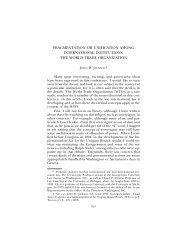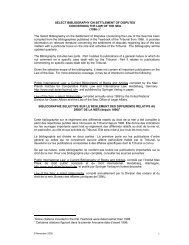Tullio Treves, Conflicts Between the International Tribunal for the ...
Tullio Treves, Conflicts Between the International Tribunal for the ...
Tullio Treves, Conflicts Between the International Tribunal for the ...
Create successful ePaper yourself
Turn your PDF publications into a flip-book with our unique Google optimized e-Paper software.
1999] INTERNATIONAL TRIBUNAL FOR THE LAW OF THE SEA 817sea, Norway accepts <strong>the</strong> jurisdiction of <strong>the</strong> Court, under Article36, paragraph 2, of <strong>the</strong> Statute, with exactly <strong>the</strong> same scopeas it has under <strong>the</strong> Convention’s compulsory jurisdictionclauses—and <strong>the</strong>ir limitations and exceptions.In light of this, it makes sense <strong>for</strong> states that have accepted<strong>the</strong> optional clause to make a declaration of preference <strong>for</strong> <strong>the</strong>Court under Article 287 with regard to disputes with states thatalso have made <strong>the</strong> declaration—not only when <strong>the</strong>y have notaccepted <strong>the</strong> optional clause, but also with regard to disputeswith o<strong>the</strong>r states having accepted <strong>the</strong> clause. The Court’s jurisdiction,when excluded by reservations to <strong>the</strong> acceptance of<strong>the</strong> optional clause, may be “restored” on <strong>the</strong> basis of Articles286 and 287. It also makes sense <strong>for</strong> states that have accepted<strong>the</strong> optional clause to prefer <strong>the</strong> <strong>Tribunal</strong> in <strong>the</strong>ir declarationsunder Article 287. The states that are in this category (Austria,Greece, Portugal, and Uruguay) will be under <strong>the</strong> compulsoryjurisdiction of <strong>the</strong> Court <strong>for</strong> disputes with o<strong>the</strong>r states accepting<strong>the</strong> optional clause and under <strong>the</strong> jurisdiction of <strong>the</strong><strong>Tribunal</strong> <strong>for</strong> disputes with o<strong>the</strong>r states preferring <strong>the</strong> <strong>Tribunal</strong>under Article 287. If reservations to <strong>the</strong> optional clause exclude<strong>the</strong> jurisdiction of <strong>the</strong> Court, in most cases, due to <strong>the</strong>low number of preferences <strong>for</strong> <strong>the</strong> <strong>Tribunal</strong>, arbitration will be<strong>the</strong> applicable procedure.V. THE COURT, THE TRIBUNAL, AND DECLARATIONS MADEUNDER ARTICLE 287 OF THE LAW OF THESEA CONVENTIONIt may be said that <strong>the</strong> Court and <strong>the</strong> <strong>Tribunal</strong> are in competition(not in conflict!) to attract declarations of preferenceunder Article 287 by states parties to <strong>the</strong> Convention. It seemsmore important, however, to note that <strong>the</strong> Court and <strong>the</strong> <strong>Tribunal</strong>are in competition, toge<strong>the</strong>r and not one against <strong>the</strong>o<strong>the</strong>r, with arbitration. Arbitration is <strong>the</strong> procedure that statesparties can declare under Article 287, that <strong>the</strong>y are presumedto prefer in <strong>the</strong> absence of a declaration, and that applieswhenever two parties to a dispute have not expressed <strong>the</strong> samepreference.






